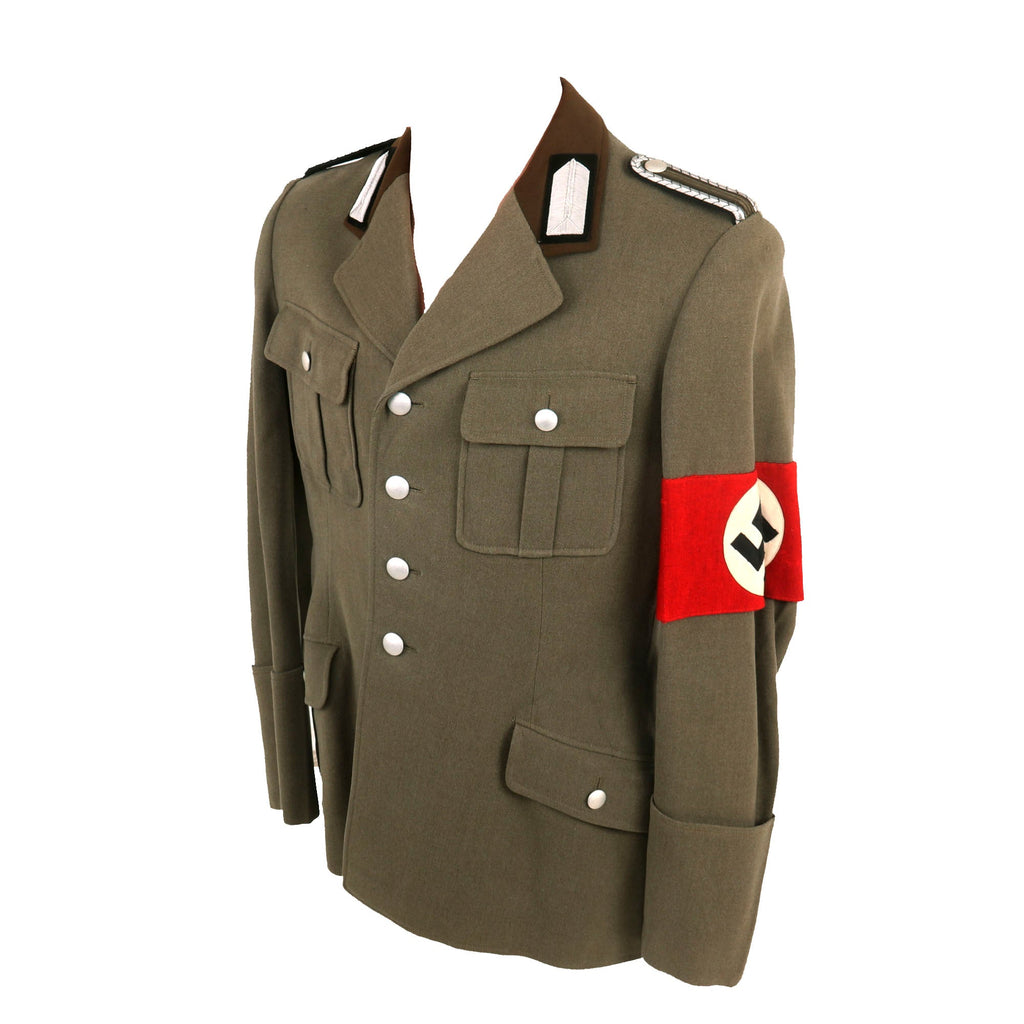Item Description
Original Item: Only One Available. This is a high quality, 1939 pattern, tailor made earth brown wool/rayon blend tunic with a fine whipcord weave. Tunic features a four button front closure with a chocolate brown collar and large lapels. Tunic has two pleated patch breast pockets with straight edged button down flaps and two slanted hip pockets with squared button down flaps. All of the buttons are the pebbled aluminum variety, maker marked on the back and sewn directly to the fabric. The left waist pocket has the large eyelet near the top for use with a dagger / hewer. The tunic's reverse features a vertical tail skirt vent.
The interior is fully lined in gold/tan ribbed rayon, and the sleeves are lined with beige HBT rayon fabric. The lining has a horizontal slash pocket on the left inner chest, and there is a maker label on the inside of the neck, though the top portion has frayed away, so we can only see Meyer & ????? / Frankfurt a./M. Kaiserstrasse 47. We attempted to find the full name of the maker, but were not successful, and the top of the label has been stabilized with transparent tape. Condition of the tunic is excellent, with just some light wear from service. The left sleeve has an early war felt NSDAP armelbinde (armband) with a multipiece rayon swas. This has been hand stitched to the arm with red thread along the top edge. Looking underneath we can see that it still has an intact paper RZM label attached.
The collar is wrapped with chocolate brown wool, and has matching silver wire woven RAD Officer style Kragenspiegel collar tabs, somewhat similar to Heer Litzen, which have a hand embroidered silver bar, referred to as "double filling" on them. The black velvet and aluminum type of collar tab was used by ranks Unterfeldmeister (Oberfeldwebel) through Obersfeldmeister (Hauptmann). The tabs have a black velvet background, the branch of service color for "General Service" in the RAD.
The "sew-in" style schulterklappen (shoulder straps) are constructed with a row of fine silver flatware "Russia Braid" double piping with black chevrons woven in, outside of a row of olive brown double piping. As is standard both rows go around a button hole on the end. These have the correct black velvet backing for "General Service" as well, and the design is specific to the rank of Unterfeldmeister, which is also sometimes referred to as Haupttruppführer.
Before the formation of the RAD from various labor service groups, the FAD (Freiwillingen Arbeitsdienst or Volunteer labor service) rank of Unterfeldmeister was actually the most junior officer rank, but when the RAD was formed, they became the most senior NCO rank. This is why the insignia used is a mixture of NCO and Officer in a way. The rank is roughly equivalent to a Heer Oberfeldwebel (Master Sergeant).
A fantastic RAD Labor Service Unterfeldmeister's uniform tunic, complete with insignia and armband! Ready to add to your collection!
Approximate Measurements:
Collar to shoulder: 9.5"
Shoulder to sleeve: 25”
Shoulder to shoulder: 16”
Chest width: 18"
Waist width: 17"
Hip width: 21"
Front length: 28"
The basis of the RAD, Reichsarbeitsdienst, (National Labor Service), dates back, at least, to 1929 with the formation of the AAD (Anhalt Arbeitsdienst) and the FAD-B (Freiwillingen Arbeitsdienst-Bayern). Shortly after AH’s appointment as Chancellor in Jan 1933, the NSDAP consolidated all labor organizations into the NSAD (Nationalsozialist Arbeitsdienst), a national labor service, under the control of Reichsarbeitsführer Konstatin Hierl. It served as an agency to help mitigate the effects of unemployment on the German economy, militarize the workforce and indoctrinate it with NSDAP ideology. It was the official state labor service, divided into separate sections for men and women.
On June 26 1935 the NSAD was officially re-designated RAD, and from then onward, men aged between 18 and 25 may have served six months before their military service. During World War II compulsory service also included young women and the RAD developed to an auxiliary formation which provided support for the Wehrmacht armed forces.
In April 1934 Hierl had developed a uniform, including the distinctive "Robin Hood" style service cap. The design of the cap was based on a cross between a traditional style peasant cap and the traditional hunters cap. Originally the caps were issued with rank distinction piping with black piping for the EM/NCO ranks of Arbeitsmann to Truppführer, silver piping for company and field grade Officer’s ranks of Obertruppführer to Oberstarbeitsführer and gold piping for General Officer’s ranks of Generalarbeitsführer to Reichsarbeitsführer. In 1940 the use of the black piping for the EM/NCO ranks was discontinued but the silver and gold Officer’s piping remained in use until the end of the war.
- This product is available for international shipping. Shipping not available to: Australia, France, or Germany
- Due to legal restrictions this item cannot be shipped to Australia, France or Germany. This is not a comprehensive list and other countries may be added in the future.
- Not eligible for payment with Paypal or Amazon















